 Petzlover
Petzlover Exotic Shorthair is originated from United States but Singapura is originated from Singapore. Both Exotic Shorthair and Singapura are having almost same weight. Both Exotic Shorthair and Singapura has same life span. Both Exotic Shorthair and Singapura has almost same litter size. Both Exotic Shorthair and Singapura requires Low Maintenance.
Exotic Shorthair is originated from United States but Singapura is originated from Singapore. Both Exotic Shorthair and Singapura are having almost same weight. Both Exotic Shorthair and Singapura has same life span. Both Exotic Shorthair and Singapura has almost same litter size. Both Exotic Shorthair and Singapura requires Low Maintenance.
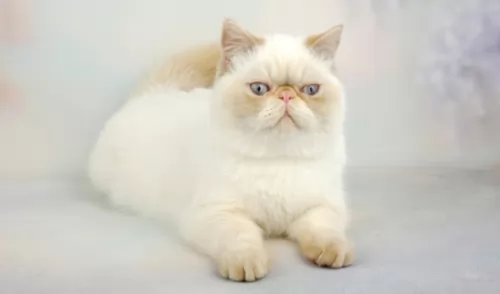 The Exotic Shorthair cat is such a sweet-faced cat that it is often referred to as the ‘lazy man’s Persian. This is because the face is also flat and pushed in like the Persian cat.
The Exotic Shorthair cat is such a sweet-faced cat that it is often referred to as the ‘lazy man’s Persian. This is because the face is also flat and pushed in like the Persian cat.
The Exotic Shorthair was in fact developed as a short-haired version of the Persian. It was in the 1950s that the Persian was used to mate with other breeds such as the Burmese.
The crossbreed gained recognition but some American Shorthair breeders produced a new breed standard that would disqualify American Shorthairs that showed any signs of crossbreeding.
It was in 1966 that the Cat Fanciers Association recognized the cat as a new breed and under the name Exotic Shorthair.
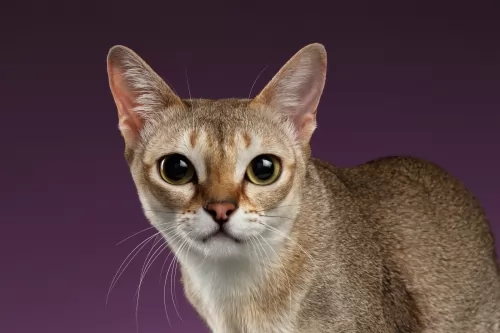 There are conflicting stories surrounding the origination of the Singapura. It does seem however, that natural Singapurans were found in Singapore.
There are conflicting stories surrounding the origination of the Singapura. It does seem however, that natural Singapurans were found in Singapore.
The first documented account was of a cat known as Chiko who was found in a Singaporean SPCA in 1980 by Sheila Bowers and WA Brad.
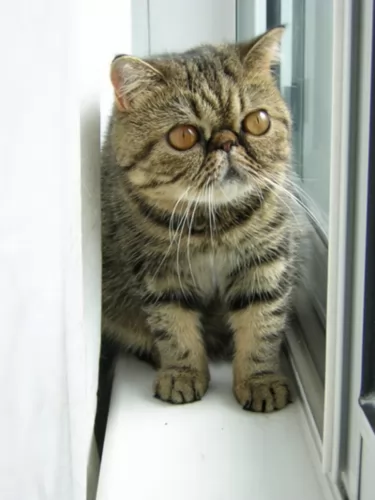 Developed through crosses between Persians and American Shorthairs as well as other cat breeds, the Exotic Shorthair looks like the Persian but he has a short coat.
Developed through crosses between Persians and American Shorthairs as well as other cat breeds, the Exotic Shorthair looks like the Persian but he has a short coat.
The coat is found in the same colors as the Persian cat – patterns and solid colors, ranging from chinchilla silver to tabby, tortoiseshell, black and white and bicolor. The eyes are large and round, the ears small and round and the tail fairly short and thick.
The Exotic Shorthair is a sweet, gentle, calm cat but a bit livelier than the Persian. They’re lively, friendly, and playful, but are also cats that like to sit in your lap and be stroked.
They get on well with children and other pets, being a loyal friend to the entire family. He quietly communicates with his human family with a soft voice. He is also quite adaptable to living conditions so long as his human family provides him with lots of attention.
He won’t want to be left for long periods of time on his own so he won’t suit living in a home where he is left alone all day.
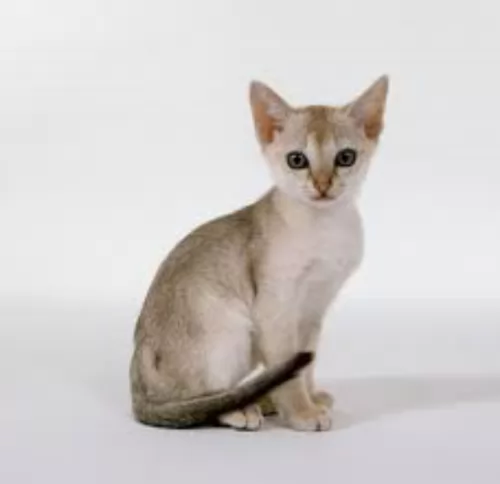 The Singapura cat is small in size, not weighing more than 2, 3 or 4kg. This short-haired, ivory-colored coat has brown ticking.
The Singapura cat is small in size, not weighing more than 2, 3 or 4kg. This short-haired, ivory-colored coat has brown ticking.
The cat is a natural breed and is muscular and strong. It is actually the smallest of the domestic cats. The cat has big ears, large green or yellowish eyes and is often referred to as ‘Pura’.
While the Singapura looks like a small, finely boned cat, when you pick him up, you discover that he is actually deceivingly heavy. The cat has slender legs with the back legs being slightly longer than the front legs. The tail ends with a recognizable black tip.
The Pura is intelligent and inquisitive and loves leaping onto high surfaces to explore. They then love to come bounding down and to land in one of his family member’s laps. This cat is a bundle of energy and playfulness. You'll need to invest in toys for your fun-loving Pura who loves nothing more than to be playing with soft little balls or scampering after a toy-mouse.
He is social and extroverted and gets along well with children and dogs in the house. He isn’t as vocal as some of the other cat breeds and actually has a quiet voice. The Singapura cat personality is outgoing, active and inquisitive and full of tricks and he is always ready to join in with any games.
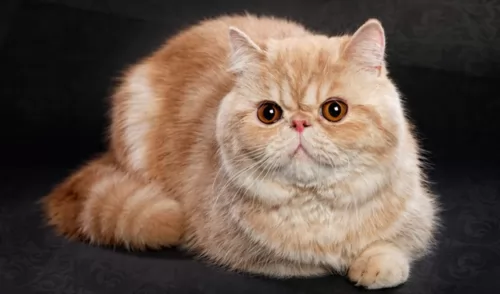 Your Exotic Shorthair is a loving cat and for those who prefer, it is a cat that is livelier than the Persian. While the Exotic Shorthair also has a mellow personality, because of its shorthair ancestors, it's more active.
Your Exotic Shorthair is a loving cat and for those who prefer, it is a cat that is livelier than the Persian. While the Exotic Shorthair also has a mellow personality, because of its shorthair ancestors, it's more active.
This Exotic cat can live to be 15, 16, or 17 if you care for him well and that means you have 15 years to share with a most wonderful feline companion.
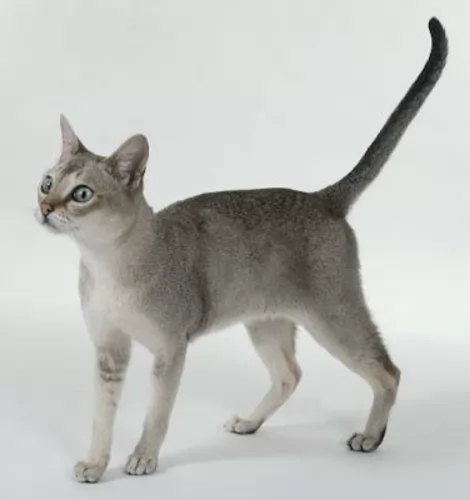 Singapuras make awesome pets and with all their energy and antics they provide hours of entertainment. They are intelligent, energetic, and playful. The people who have them say they become your best friend because they are cats that are sensitive to the moods of their human owners.
Singapuras make awesome pets and with all their energy and antics they provide hours of entertainment. They are intelligent, energetic, and playful. The people who have them say they become your best friend because they are cats that are sensitive to the moods of their human owners.
Dynamite comes in small packages, and that’s exactly what you get when you bring the small Singapura cat into your home and life.
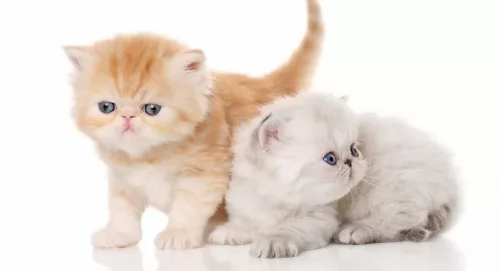 With the Exotic Shorthair, some of the diseases are genetic while others can be encouraged by poor diet and lifestyle.
With the Exotic Shorthair, some of the diseases are genetic while others can be encouraged by poor diet and lifestyle.
Obesity for instance is a major disease of cats and it contributes to many serious illnesses in cats. Excess weight shortens your cat’s life and contributes to arthritis and diabetes. The extra weight puts a strain on the cat's joints. Shedding just a little bit of weight can result in improved mobility.
Dental disease is a common chronic problem in pets. Make sure to check inside your cat’s mouth from time to time as serious dental problems can cause pain and interfere with the health of your cat’s important organs such as heart and kidneys.
All kinds of parasites can invade your Exotic Shorthair's body, internally and externally – worms, fleas, and ticks - and cause your pet a tremendous amount of pain and discomfort.
Brachycephalic Syndrome is a respiratory distress syndrome and it mostly affects what is known as brachycephalic cats – those cat with snub faces like the Exotic Shorthair.
The flattened features of the face make it that there is less space for the tissue to grow. The soft area at the back of the roof of the mouth hangs into the airway, obstructing it, and they can’t breathe normally. Sometimes the cats will require surgery to allow for more regular breathing.
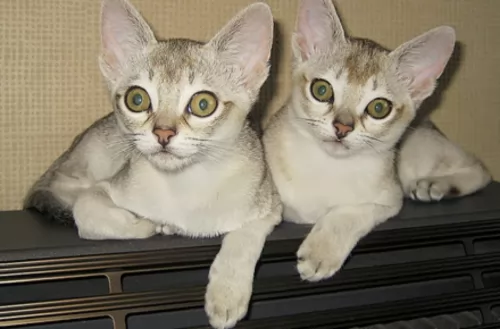 Your sweet Singapura cat has no particular genetic problems to deal with and also no specific health concerns. Although he is a generally healthy cat, one health condition that you want to be aware of is uterine inertia with the females.
Your sweet Singapura cat has no particular genetic problems to deal with and also no specific health concerns. Although he is a generally healthy cat, one health condition that you want to be aware of is uterine inertia with the females.
This particular condition was found in one of the foundation cats and still appears in some Singapura females.
Look after him well and return his love, and health issues will remain low. Having said that, every cat breed can develop health problems, and it pays to understand some of the more common cat illnesses.
Feline Lower Urinary Tract Disease is something that both male- and female cats can get. Watch that your Singapura doesn’t become overweight or unfit because this disease often occurs in cats who have become overweight.
Stress with a cat can also bring about this most uncomfortable disease in your cat. You’ll see your cat straining to urinate, he cries when urinating, and he isn’t his usual chirpy self. He may even have bloody urine. Get your pet to the vet immediately as not being able to urinate is an emergency.
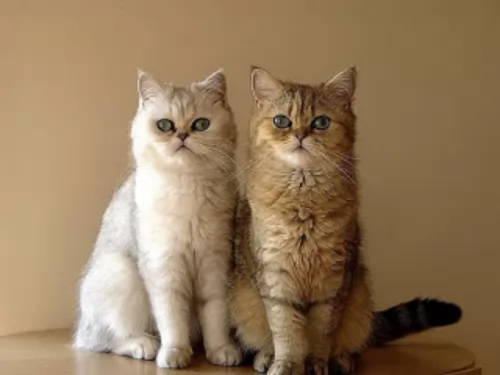 It is important to understand the type of foods available to your pet and how often and how much to feed him.
It is important to understand the type of foods available to your pet and how often and how much to feed him.
Most cats prefer to eat several small meals a day as opposed to a couple of large ones. Make feed times interesting and provide food puzzles to have your cat ‘prey’ for food.
Always read and understand the labels on the cat food packaging and be sure to always feed your Exotic Shorthair with the very best food there is and to follow the portion guides.
If you’re in any doubt or your cat doesn’t want to eat his food, try something else or speak to your vet about how to be sure your cat is getting fed the best food there is.
Make sure to have your kitten vaccinated as required. Also, when you take your kitten in to be vaccinated, the vet will also perform a check-up to make sure your kitten is healthy as these cats are susceptible to bacterial and viral infections.
Your cat has a short, low maintenance coat. A brush once a week can get rid of loose hairs and you and your cat will both enjoy the therapeutic bonding between the two of you.
Check your cat’s inner ears for wax and debris as well as for signs of any infection, and if you don’t want to do that, professional cat groomers can do it for you.
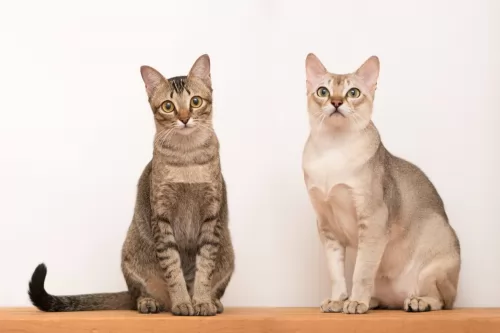 Your Singapura cat’s short coat is easy to groom. Brush your pet every week to remove the loose hairs and to also keep the coat sleek and shiny.
Your Singapura cat’s short coat is easy to groom. Brush your pet every week to remove the loose hairs and to also keep the coat sleek and shiny.
Every cat is a carnivore. Singapuras need meat if you want to avoid your cat getting some of the cat health problems there are. Singapura’s digestive system isn’t designed for foods that humans eat.
He will need high-quality food to ensure his ongoing good health. If you are going to feed your Singapura commercially packaged foods, take a good look at the ingredient list and make sure that meat and protein is at the top of the list.
Always buy age-appropriate food. You can imagine that a tiny kitten’s food requirements will be very different to that of an adult cat.
A kitten will require at least 3 or 4 meals a day. It is always a good idea to consult your vet for suggestions on what brand- and type of food to give your kitten and your adult Singapura.